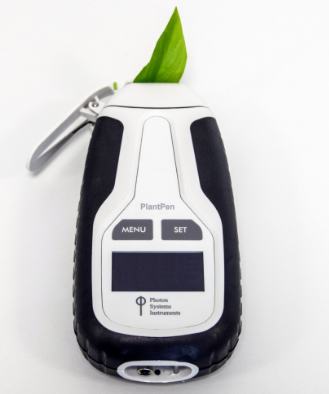用途:PlantPen系列植物PRI & NDVI计是一款小巧的快速测量植物反射光谱指数的野外便携式仪器,可根据反射系数确定植物特征。通过各种反射系数可以评定叶绿素含量,和其他重要的特征。有两个标准版本光化学反射系数(Photochemical Reflectance Index,PRI)和归一化植被指数(Normalized Difference Vegetation Index,NDVI)。整合了蓝牙技术(蓝牙模块或USB软件狗),FluorPen 1.1软件提供可视化操作和数据传输到PC上。根据用户需要,还可提供定制服务。

两种标准版本:
■PRI 210植物光化学反射系数计:在531nm~570nm波段之间测定叶反射系数。该参数对类胡萝卜素极为敏感,反应植物的光合作用中的光能利用效率和CO2同化速率,并可作为植物水胁迫的可靠指数。因此广泛用于植物产量和胁迫研究。
■NDVI 310植物归一化植被指数计:用来测定NDVI(一种植物体叶绿素重要的指标),在660nm~740nm波长处比较反射光。叶绿素会强烈吸收红光用于光合作用,而叶片细胞结构会强烈反射近红外光。因此,NDVI与光合能力直接相关,从而反映植物冠层的能量吸收状况。


应用领域:
■快速测量叶绿素含量;
■植物生物学;
■植物筛选和野外研究;
■胁迫生理学;
■农学和林学
功能特点:
携带方便、操作简单。
直接无损测量得到NDVI和PRI值。
内置蓝牙与USB双通讯模块,GPS模块,输出带时间戳的地理位置
软件可导出数据为Excel格式,具备实时控制和遥控功能。
可用于农业、林业以及植物学中光合作用、逆境胁迫等的研究和教学。
技术参数:
测量参数 |
PRI(光化学反射指数)=(R531-R570)/(R531 + R570)参考:Sellers等。(1985) NDVI(归一化差异营养指数)=(R740-R660)/(R740 + R660)参考文献:Rouse等。(1974年) |
测量光 |
PRI 210:内部双波长光源R531 = 531nm,R570 = 570nm NDVI 310:内部双波长光源VIS = 635nm,NIR = 760nm |
探测波长范围 |
PRI 210: 500-600 nm; NDVI 310:620-750 nm |
软件适用系统 |
Win7及以上 |
样品夹 |
机械式叶夹 |
Bios |
可升级固件 |
存储容量 |
16M |
通讯模式 |
USB或蓝牙 |
内部数据采集 |
100,000个 |
显示 |
图形显示 |
键盘 |
密封防水设计2键 |
自动关机 |
无操作5分钟后 |
节电模式 |
自动休眠 |
电源 |
可充电锂电池 |
充电方式 |
USB充电 |
电池容量 |
2000 mAh |
最大充电电流 |
0.5 A |
电池寿命 |
连续工作70小时 |
低电探测 |
显示低电量报警 |
尺寸 |
135x 65 x 33 mm |
重量 |
188g |
工作环境 |
温度0-55℃,湿度0-95%非冷凝环境 |
存储环境 |
温度-10~60℃,湿度0-95%非冷凝环境 |
产地:捷克
PlantPen 手持式植被指数测量仪参考文献列表
BARTAK M., HAJEK J.., MORKUSOVA J., ET AL. (2018). Dehydration-induced changes in spectral reflectance
indices and chlorophyll fluorescence of Antarctic lichens with different thallus color, and intrathalline
photobiont. Acta Physiologiae Plantarum, 40(10).
DOI: 10.1007/s11738-018-2751-3
CROFT H. AND CHEN J. (2018). Leaf Pigment Content. Reference Module in Earth Systems and
Environmental Sciences.
DOI: 10.1016/B978-0-12-409548-9.10547-0
FERNÁNDEZ-MARÍN, B., GARCÍA-PLAZAOLA, J. I., HERNÁNDEZ, A., & ESTEBAN, R. (2018). Plant Photosynthetic Pigments: Methods and Tricks for Correct Quantification and Identification. Advances in Plant Ecophysiology Techniques, 29–50.
DOI:10.1007/978-3-319-93233-0_3
JABRAN K. AND DOĞAN M. N. (2018), High carbon dioxide concentration and elevated temperature impact
the growth of weeds but do not change the efficacy of glyphosate. Pest. Manag. Sci, 74: 766–771.
DOI:10.1002/ps.4788
TRNKOVÁ K. AND BARTÁK M. (2017). Desiccation-induced changes in photochemical processes of
photosynthesis and spectral reflectance in Nostoc commune (Cyanobacteria, Nostocales) colonies from
polar regions. Phycological Res. Volume 65.
DOI:10.1111/pre.12157
BARTÁK M., HAZDROVÁ J., SKÁCELOVÁ K., ET AL. (2016). Dehydration - induced responses of primary
photosynthetic processes and spectral reflectance indices in Antarctic Nostoc commune. CZECH POLAR
REPORTS 6(1): 87-95
MENDONÇA L. L. R., ALVES F. R., CHAGAS E. N., et al. (2016). Management of Meloidogyne javanica with
biological pesticides and oils in a lettuce field. Nematoda. Volume 3.
DOI: 10.4322/nematoda.01515
LÓPEZ-LÓPEZ M., CALDERÓN R., GONZÁLEZ-DUGO V., ET L . (2016). Early Detection and Quantification of
Almond Red Leaf Blotch Using High-Resolution Hyperspectral and Thermal Imagery. Remote Sens.
Volume 8.
DOI:10.3390/rs8040276
BARTÁK M., TRNKOVÁ K., HANSEN E.S. ET AL. (2015). Effect of dehydration on spectral reflectance and
photosynthetic efficiency in UMBILICARIA ARCTICA and U. HYPERBOREA. Biol Plant. 59.
DOI: 10.1007/s10535-015-0506-1
CALDERÓN R., LUCENA C., TRAPERO-CASAS J. L. ET. AL. (2014). Soil temperature determines the reaction of olive cultivars to Verticillium dahliae pathotypes. PLoS One. Volume 9
DOI: 10.1371/journal.pone.0110664
CALDERÓN, R., ZARCO-TEJADA, P.J., LUCENA, C. ET AL. (2013). High-resolution airborne hyperspectral and
thermal imagery for pre-visual detection of Verticillium wilt using fluorescence, temperature and narrowband indices, Remote Sensing of Environment. Volume 139 Pages, 231-245.
DOI: 10.1016/j.rse.2013.07.031
ZARCO-TEJADA P.J., GUILLEN-CLIMENT M.L., HERNANDEZ-CLEMENTE R. ET AL. (2013): Estimating leaf carotenoid content in vineyards using high resolution hyperspectral imagery acquired from an unmanned aerial vehicle. Agricultural and Forest Meteorology 171-172. Pages. 281-294.
DOI: 10.1016/j.agrformet.2012.12.013
JUPA R., HÁJEK J., HAZDROVÁ J. ET AL. (2012). Interspecific differences in photosynthetic efficiency and
spectral reflectance in two Umbilicaria species from Svalbard during controlled desiccation. Czech Polar
Reports, Brno, Volume 2, Pages 31-41.
DOI: 10.5817/CPR2012-1-4
KOVÁR, M., VEVERKOVÁ, E. AND ČERNÝ, I. (2012). Utilization of Enfrared Thermography and Leaf Reflectance Indices in Evaluation of Effects of the Treatment of Sunflower (Helianthus annuus L.) by Biologically Active Compounds. Acta fytotechnica et zootechnica. Volume 15, Pges 23-28
SHRESTHA S., BRUECK H. AND ASCH F. (2012). Chlorophyll index, photochemical reflectance index and
chlorophyll fluorescence measurements of rice leaves supplied with different N levels. Journal of
Photochemistry and Photobiology B: Biology. Volume 113, Pages 7–13
DOI: 10.1016/j.jphotobiol.2012.04.008
ZARCO-TEJADA P.J., GONZALES-DUGO V. AND BERNI J.A.J. (2012): Fluorescence, temperature and narrow-band indices acquired from a UAV platform for water stress detection using a micro-hyperspectral imager and a thermal camera. Remote Sensing of Environment. Volume, 117. Pages 322-337.
DOI: 10.1016/j.rse.2011.10.007
CHYTYK, C. J., HUCL, P. J. AND GRAY, G. R. (2011). Leaf photosynthetic properties and biomass accumulation
of selected western Canadian spring wheat cultivars. Canadian Journal of Plant of Science. Volume 91,
Pages 305-314.
DOI: 10.4141/CJPS09163